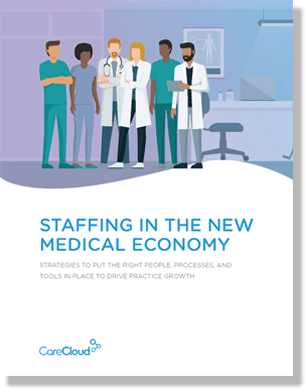by Brian Zelenka – Vice President Marketing
Thanks to COVID-19, a majority of healthcare real estate expansion plans, and future decisions regarding real estate, have stalled. Social distancing, shelter-in-place mandates, and the success of telehealth mean fewer medical office buildings and hospital developments will plan to break ground this year. Even though many practices are re-opening their physical locations, patients are slow to reemerge, and many have become comfortable with the idea of receiving care via digital means. MTBC spoke with GPO partner, Newmark Knight Frank (NKF), a full-service real estate advisory firm, to offer further projections and advice concerning healthcare real estate futures.
To say that COVID-19 has disrupted healthcare real estate would be stating the obvious; the impacts directly affect leasing and acquisition/disposition activity, and both mergers and acquisitions are expected to slow in the months to come. Furthermore, real estate strategies of individual firms will continue to shift due to economic insecurities.
Even after the economy re-stabilizes, expect the real estate market not to. Expect price fluctuations over the coming months as landlords and real estate groups begin to recover. Again, with telehealth continuing to be on-trend, decreased space demands will cause unsteady prices for the foreseeable future.
What does this mean for providers occupying or looking for space? Keep in mind that this may not be the time to make high-risk moves, and monetizing existing space may be in your best interest.
Mitigate Future Real-Estate Risks
Due to COVID-19, both landlords and occupants should be aware of temporary sanction waivers that govern Stark Laws. These waivers involve noncompliant real estate arrangements, rental charges, fair market value remuneration, and other leasing and referral arrangements. These temporary waivers provided hospitals and physicians with more flexibility during the pandemic. Still, they will only remain in effect for the lesser of either (i) 60 days from issuance or (ii) the termination of either the national emergency declared on March 13, 2020, or the public health emergency announced on January 31, 2020.
If you require short-term relief, you’re not alone, and if you haven’t yet approached your landlord, we strongly advise that you send your landlord a message as soon as you can. If up against renewal, or considering signing a new lease, add force majeure or specific language regarding government orders into any new agreements. Consider incorporating a pandemic/national emergency clause in any future lease agreements.
This clause details explicitly rent abatement during any period that federal, state, or local government requires a shutdown of business and/or when you are not able to access the premises due to said shutdown.
Creative Financing Structures
From a financial perspective, providers are preparing for a dip in Days Cash On Hand (DCOH) during this phase and could be seeking alternatives to finance short-term critical needs. These needs include equipment or interim real estate solutions. There are several advantageous financing structures that you should consider for ongoing or new requirements, including monetizing your property.
Real Estate Forecast Snapshot:
- For the majority, real estate decision making is on hold.
- Fewer medical office buildings and hospital developments expect to break ground in the near future.
- Merger and acquisition activity involving healthcare firms is expected to slow. Structural changes already in motion are expected to continue.
- Even after the economy and markets stabilize, price fluctuation should be expected. The trend toward telehealth further challenges the real estate market for healthcare.
- With COVID-19 expected to generate a new reluctance for utilizing public transportation, this will have an impact on offices in the large urban cores and may cause a potential shift to suburban health care locations and perhaps require additional parking requirements or parking demand.
The disruption of COVID-19 will most likely cause on-going instability surrounding the healthcare real estate market in the months ahead. If you need more information or have concerns regarding your brick and mortar space, contact your real estate advisor. You can also access discounted real estate services through MTBC’s GPO by visiting our learning center.
Resources:
MTBC Group Purchasing Organization

Brian Zelenka
Vice President, Marketing



